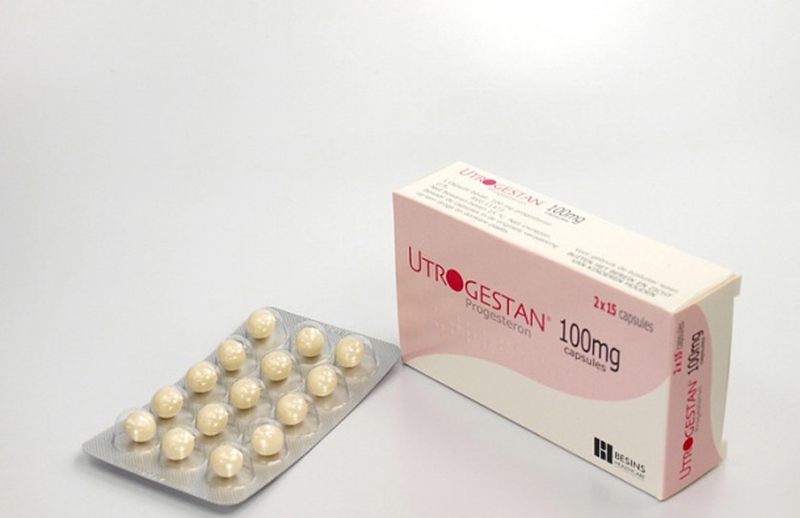Hormone replacement therapy (HRT) is a common method of replenishing the levels of certain female hormones after the menopause. One of these hormones, progesterone, is a steroid hormone produced in the body that is essential for maintaining the normal menstrual cycle and fertility. It acts by stimulating ovulation, and thickening and preparing the womb lining for an embryo. Insufficient progesterone can result in issues such as infertility and disturbances in the menstrual cycle. With the active ingredient progesterone, Utrogestan is a popular drug for restoring progesterone levels in the body.

When Is Utrogestan Needed?
Utrogestan can be used to treat conditions such as irregular menstruation, low fertility, and heavy menstrual bleeding, as well as easing menopausal symptoms such as mood imbalances, insomnia, night sweats and irregular periods.
When Not to Use Utrogestan
You should not use Utrogestan if you have the following conditions:
Severe liver disease
Previous or current breast cancer
Porphyria
Soya allergy
Unexplained vaginal bleeding (not due to menstrual periods)
Allergy to progesterone or any other component of Utrogestan
Cancer of the sex organs like ovary, uterus, cervix, vagina, or external genitalia
Stroke, blood clots, or bleeding from the brain
Speak to your doctor or pharmacist before you take Utrogestan if you have any of the following medical conditions:
Depression
Diabetes
Epilepsy
A heart condition or high blood pressure
Photo-sensitive skin
Liver or kidney disease
Migraine
Asthma
If you are unsure about taking Utrogestan, get advice from a healthcare professional first.
How to Use Utrogestan
Utrogestan Capsules
Utrogestan capsules are usually used to alleviate menopausal symptoms, irregular periods, and heavy bleeding. Swallow Utrogestan capsules whole with a drink of water on an empty stomach. You should always follow the advice given by your doctor, but in general, Utrogestan capsules can be taken in two ways, both of which counteract the effects of estrogen on the lining of the uterus:
Two Utrogestan 100mg capsules at night-time for 12 days in the second half of the menstrual cycle that is from day 15 to 26. You will then usually have a withdrawal bleed (like a period) the next week.
One Utrogestan 100mg capsule at bedtime from day 1 to 25. With this regime, you probably won’t get as much withdrawal bleeding.
Utrogestan Tablets
Utrogestan vaginal tablets are most often used by women with fertility issues. The tablets are placed into the vagina with the applicator provided. Instructions for using this applicator are usually supplied with the Utrogestan packaging. For correct dosage, read these instructions carefully.
What Are the Possible Side Effects of Utrogestan?
Common side effects experienced with Utrogestan include:
Tiredness
Dizziness
Trouble sleeping
Nausea
Bloating
Depression
High temperature
Changes to the menstrual cycle other than the withdrawal bleed
Changes to the vaginal discharge
Symptoms of premenstrual tension: back pain, abdominal pain, irritability
Swollen ankles
Weight loss or weight gain
Breast tenderness
Skin issues, e.g. acne or rash
Changes to sexual function and desire
Increased hair growth or hair loss
If you experience the following symptoms while taking Utrogestan, make an appointment to speak with your doctor as soon as possible:
The development of blood clots (thrombi) in the veins of the legs or pelvis
Changes in the breasts like dimpling of the skin, lumps, or issues with the nipples
If you develop headaches, eye problems, or the signs of jaundice (yellow skin or yellowing of the whites of the eyes), stop taking Utrogestan right away and seek immediate medical help.
Special Concerns About Using Utrogestan
You should never take Utrogestan if you have, or have ever had breast cancer. You should know with its high quantities of progesterone, Utrogestan increases the risk of breast cancer in women who have not had it previously. The risk is greater for women who have had a late menopause.
For all types of HRT, the chances of developing breast cancer become greater if you take the medication loner. Taking the drugs for 5 years or more will significantly increase your risk. However, after women have been off HRT for longer than 5 years, their risk returns to that of women who have never received the drugs.
Other risk factors for breast cancer include:
A close relative (i.e. mother, sister, or grandmother) who has had the disease
Obesity
If you are concerned or confused about your chances of developing breast cancer, it is always best to speak with your doctor.

View All Comments /Add Comment